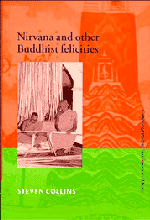Book contents
- Frontmatter
- Contents
- Preface and acknowledgments
- List of abbreviations
- Textual chronology
- General introduction: Buddhism and civilizational history 1 – structures and processes
- PART 1 NIRVANA IN AND OUT OF TIME
- PART 2 PARADISE IN HEAVEN AND ON EARTH
- Introduction to part 2: utopia and the ideal society
- 4 Heaven, the land of Cockaygne and Arcadia
- 5 Millennialism
- 6 The perfect moral commonwealth? Kingship and its discontents
- 7 The Vessantara Jātaka
- Conclusion to part 2: in what sense can one speak of Buddhist utopianism?
- General conclusion: Buddhism and civilizational history 2 – reprise
- Appendices (translated texts)
- Bibliography
- Glossary and index of Pali and Sanskrit words
- Name index
- Subject index
6 - The perfect moral commonwealth? Kingship and its discontents
Published online by Cambridge University Press: 18 December 2009
- Frontmatter
- Contents
- Preface and acknowledgments
- List of abbreviations
- Textual chronology
- General introduction: Buddhism and civilizational history 1 – structures and processes
- PART 1 NIRVANA IN AND OUT OF TIME
- PART 2 PARADISE IN HEAVEN AND ON EARTH
- Introduction to part 2: utopia and the ideal society
- 4 Heaven, the land of Cockaygne and Arcadia
- 5 Millennialism
- 6 The perfect moral commonwealth? Kingship and its discontents
- 7 The Vessantara Jātaka
- Conclusion to part 2: in what sense can one speak of Buddhist utopianism?
- General conclusion: Buddhism and civilizational history 2 – reprise
- Appendices (translated texts)
- Bibliography
- Glossary and index of Pali and Sanskrit words
- Name index
- Subject index
Summary
It is scarcely controversial to observe, given the material conditions of premodern agrarian states, that social utopias of a perfect moral community flourishing under a benevolent king were more than a little distant from everyday realities. Kautsky offers a general picture of The Politics of Aristocratic Empires (1982: 343–4), in which
Government is instituted in order to tax, its function is to take from the peasants rather than to give anything to them, and it can hence be understood as an extractive enterprise … In order to tax peasants aristocrats must control them. They do not have to direct their labor or interfere in village politics, but they must be able to deprive them of their surplus and – which requires far greater effort – keep other aristocrats from doing so. Because peasants and the land they work are the principal source of wealth in agrarian economies, aristocrats ceaselessly compete for control of the land and peasants. Warfare, both offensive and defensive, then, is required to conquer, expand, or maintain a tax base which is, in turn, required to permit warfare. Closely related to taxation, it is the only other essential function of government in aristocratic empires.
Mabbett and Chandler, writing a chapter on “Ruler and State” in their survey of the history of The Khmers, remind their readers that:
Only a few generations of people living in modern western countries have ever been able to regard peace as a natural condition with its own equilibrium.
- Type
- Chapter
- Information
- Nirvana and Other Buddhist Felicities , pp. 414 - 496Publisher: Cambridge University PressPrint publication year: 1998
- 1
- Cited by

